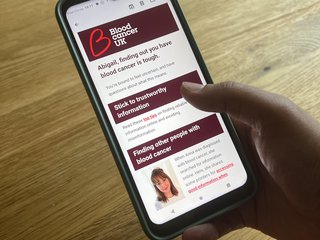Myeloma symptoms
Myeloma, also called multiple myeloma, causes changes in your blood and bone marrow. This in turn causes a wide range of symptoms.
Spotting the symptoms
Often people with myeloma look back and realise they were experiencing symptoms for some time before they got their diagnosis. These might be long-lasting infections, back pain or fatigue. Understandably, many assumed they were run down or had pulled a muscle. So myeloma symptoms can be hard to spot.
If you have any symptom that you can’t explain, that goes on for a long time, or is unusual for you, speak to your GP.
"People may think, ‘The GP’s really busy. And I don't want to sit in A&E for hours.’ But if I hadn't done that, at what point would it have got found out? So if you don't think something's right, get it checked."
Kerry, living with myeloma since 2021
Read Kerry's story about how myeloma treatment affected her fertility

CRAB symptoms
Myeloma symptoms are often called CRAB symptoms because they are caused by:
- Calcium levels in the blood being too high
- Renal (kidney) damage
- Anaemia (a low level of red blood cells)
- Bone damage.
Symptoms of too much calcium in the blood
- feeling sick (nausea)
- low appetite
- difficulty pooing (constipation)
- needing to wee more often
- feeling thirsty
- low energy levels
- feeling confused or dazed.
Symptoms of renal damage
- extreme tiredness (fatigue)
- itchy skin
- feeling sick (nausea)
- fluid retention, which can make you short of breath and make your ankles swell.
Symptoms of anaemia
- feeling tired
- feeling breathless
- paleness (pallor) best seen in the lips, gums, tongue, nail beds or the inside of the eye lids.
Symptoms of bone damage
You may have bone pain, especially in your back, ribs or hips, that:
- gets worse if you sneeze, cough or strain
- gets worse over time
- doesn’t go away and stops you sleeping
- is worse when you lie on your back.
You may experience bone fractures. These are caused by lytic lesions – holes that weaken the bones.
If your bones are weakened by myeloma, everyday things such as sneezing or lifting something can cause fractures.
"I was just getting ready for work and I gave the most almighty sneeze and felt my back go. I thought I’d pulled a muscle but in fact that sneeze had collapsed two vertebrae."
Joan, living with myeloma since 2006
Find out how Joan and others are coping with a myeloma diagnosis.

Spinal cord compression
The bone damage caused by myeloma can also cause pressure on your spine, known as spinal cord compression.
You should get help immediately if you experience symptoms of spinal cord compression because it needs urgent treatment. The main symptoms are:
- weakness, pins and needles or numbness in your legs or arms
- difficulty walking
- not being aware of when you need to wee or poo, not being able to control weeing or pooing, or not being able to go to the loo at all.
Other symptoms of myeloma
- blurred vision, dizziness or headaches
- unexplained bruising
- unusual bleeding such as frequent nosebleeds or heavy periods.

Information for the Black community
Get essential information about blood cancer including stories from Black people with blood cancer and where to find support.
Smouldering or asymptomatic myeloma
Some people have no symptoms or CRAB changes when they are diagnosed with myeloma. This type of myeloma is called smouldering myeloma (or sometimes asymptomatic myeloma) and it may not need treatment for some time, or in some cases, never.
After diagnosis - when to contact your hospital
If you have a diagnosis of myeloma or you’re being tested for it, it is important to be aware of new symptoms and tell your hospital team straight away.
They will tell you whether you need to see them, or if you should see your GP instead.
Because your immune system won’t be working well, you should also look out for symptoms of infection. Infections can get worse quickly, so make sure you tell your hospital team if you have any of these symptoms, or just feel generally unwell:
- fever (a temperature of 37.5°C or above)
- low temperature (less than 36°C)
- shivering and sweating
- feeling confused
- sore throat and cough
- rashes and swelling
- frequent watery poos (diarrhoea)
- a burning or stinging sensation when weeing, or trouble weeing at all
- unusual stiffness of the neck
- achy flu-like symptoms
- unusual discharge (fluid) from the vagina or itching in and around it.
Be aware that symptoms of infection may be less obvious because of your illness, or if you’re taking paracetamol-based medicines.
You should not take any medicine containing ibuprofen to ease your symptoms because it can increase your risk of kidney damage.
If in doubt, contact your hospital team or GP and they will tell you what to do. Share this page with your family and friends so they have this information too.

Get a weekly support email from us
We'll send you clear and simple information, practical tips, and advice from other people with blood cancer, to help during the first few weeks and months after diagnosis.
